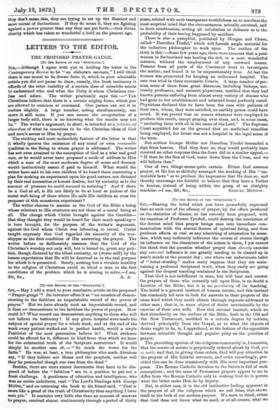LETTERS TO THE EDITOR.
THE PROPOSED PRAYER-GAUGE.
rro THE EDITOR OF THE "SPECTATOR.")
Sin,—Although I agree with you in holding the letter in the Contemporary Review to be "an elaborate sarcasm," I still think there is one moral to be drawn from it, which in your admirable article you did not pause to draw, namely, the fresh testimony it affords of the utter inability of a certain class of scientific minds to understand who and what the Deity is whom Christians con- k and adore. The writer practically says this :—" You Christiana believe that there is a certain mighty force, which you are allowed to summon at command. One person can set it in motion slightly. A large number, acting simultaneously, can move it still more. If you can secure the co-operation of a larger body still, there is no knowing what the results may not be." The writer's argument, in short, is intended as a reductio ad absurdum of what he conceives to be the Christian ideas of God and men's access to Him by prayer.
The striking and most melancholy feature of the letter is that it wholly ignores the existence of any moral or even reasonable qualities in the Being to whom prayer is addressed. The writer has not even attained to the conception of God as a wise and good man, or he would never have proposed a mode of address to Him which a man of the most moderate degree of sense and decency would instinctively resent if paid to himself. What would the writer have said to his own children if he heard them concocting a plan for making an experiment upon his good-nature, not dictated by their real necessities or honest desires, but by curiosity as to the amount of pressure be could succeed in resisting ? And if there be a God at all, is He not likely to be at least as jealous of the moral well-being of those whom Ile calls His children as even the proposer of this monstrous experiment?
The writer chooses to assume as the God of the Bible a being whose relations to His creatures are not those of a moral being at all. The charge which Christ brought against the Gentiles— that they thought they would be heard for their much speaking— is here brought, for the purpose of the writer's argument, against the God whom Christ was labouring to reveal. Christ taught expressly that God regarded the sincerity of the wor- shipper as the first condition of His answering the prayer. The writer before us deliberately assumes that the God of the Christian's worship not only will, but is bound to, grant any peti- tion, though dictated by the idlest curiosity, or (worse still) by the insane expectation that He will be deceived as to the real purpose for which it is presented. Surely, nothing but a virulent hostility to the religion of Christians could so blind a man to the first conditions of the problem which he is aiming to solve.—I am,


































 Previous page
Previous page